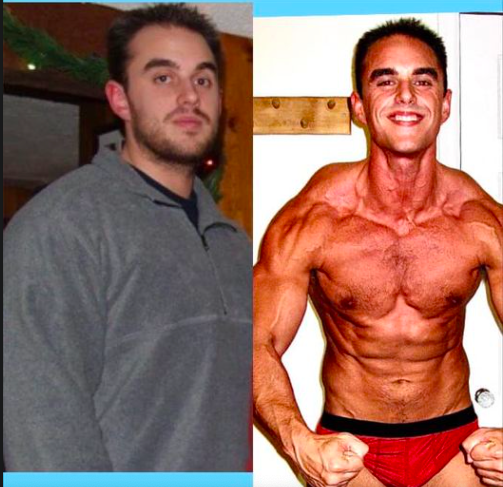|
A lot of people have a hard time understanding how I never did more than 16 minutes of cardio while I personally cut bodyweight from around 290 to 220.
Aside from the obvious role of consistency and nutrition, there is this thing called EPOC: excess post-exercise oxygen consumption. In fact, everything we do affects how much oxygen the body consumes thereafter (sometimes more, sometimes less) consequently impacting how the body distributes its energy for a time. Your rate of oxygen consumption is linearly connected to how much and how you remove body fat. Think about how much oxygen an elite track athlete must consume to resume pre-race equilibrium after hitting 26 miles per hour at peak sprint. That’s why they’re so lean even if they only exert themselves for 45 or fewer seconds at a time. The general issue for the average person is an erroneous understanding based on the calories-in/calories-out distraction/pseudoscience/mythology. People think they have to progressively starve while progressively slaving away more minutes of exercise. But both DECREASE resting oxygen consumption and baseline metabolism. This is a severe problem of scale, since you have 168 hours in a week. If you DECREASE fat burn during 160 hours in a week because of too minimal of eating and 8 hours of low-to-moderate intensity exercise (i.e. - no sprints or progressive weight training), how will your NET outcome IMPROVE? Proper use of EPOC to affect body composition and athleticism never requires MORE minutes of exercise. It does, however, require precision. You must increase work performed within the SAME OR LESS time. This takes rigor, because you have to ensure you can continue the progressions for a very long time. Picture this: On the first week, you spend 20 minutes 3 days per week, first warming up for a few minutes, then completing 4 working sets of weighted squats. In 4 weeks, it's still 20 minutes, it's still 4 sets of squats, but the weight lifted is 25% more. You consume more oxygen. You are telling the body to get leaner in the other 167 hours per week that you aren't working out. Your stronger muscles are using up more calories in all of your other activities throughout the week, whether it's sleeping, driving a car, or walking up your workplace steps. In another 4 weeks, it's still 20 minutes (maybe less), and still 4 sets of squats, but the weight lifted is ANOTHER 10% more (38% more than your start). You consume even more oxygen. You are telling the body to get even leaner in the other 167 hours. In another 4 weeks, your weekly time commitment is the same or less, but your metabolic benefit can be over 45% better. Peak sprints or sprint intervals can be programmed the same way. That's NO increase in exercise time cost for a quarter to a half-a-year WHILE rapidly shedding fat. If, foolishly, you go too hard and tap out your potential exercise intensity early, then you can’t well use this tactic for more than a week or two. Practically immediately you're stuck in the time trap, where you have to keep working out longer, hoping that you aren't shutting down metabolism during the other 164 hours in the week, the other 162 hours, the other 160, the other 158, the other 156. Do you yet see the problem you've created? Even if you exercise 20 hours per week, while you've shut down your metabolic advantages for the other 148 hours, there is no way to coax the body into progress. Almost 90% of your weekly hours are spent getting fatter. That's for people who exercise 20 hours per week! For people who do no strengthening, 100% of your weekly hours are spent getting weaker. The average person who thinks she's working diligently at fitness is spending 100% of her hours getting weaker and over 90% getting fatter. People hold up their personal yardwork or home landscaping as evidence of fitness efforts; but, again, even if it's 40 hours per week, more than 76% of the week is spent getting fatter without a precise and rigorous EPOC program in place. However, when EPOC is done properly/strategically, the calories/macros and time spent on exercise can stay about the same (sometimes calories actually have to increase because your exercise demands have gone up so much, or time of workouts has to decrease because the intensity has so skyrocketed), and your body continues to get leaner and more athletic. No certified or licensed professional strength coaches disagree. I've heard some pop fitness influencers contend this; but none of those naysayers have lost 70lbs doing no more than 16 minutes of cardio, nor do they have clients who are 100lbs lighter 15-20 years later. But I have; and I do. And I'm telling you: you can get shredded with fewer minutes of exercise.
0 Comments
Your comment will be posted after it is approved.
Leave a Reply. |
Elev8 Wellness
|
LIVE. AWESOME.We offer the highest quality in personal fitness, nutrition, and mindset coaching, helping you achieve your fitness, health, wellness and performance goals no matter the obstacle. With virtual online training and private, in-studio training we make it easier to reach your wellness goals safely.
No more can't. No more not good enough. If you compete in a sport, let your mind no longer hold you back from being the greatest. If you don't, let your mind no longer hold you back from being the best version of you that you can be. Sign-up for a Tour Covid Screen Waiver Elev8 Waiver Become an Elev8 Instructor Space Rental |
6244 lyndale ave. s., minneapolis, mn 55423
|
© 2021 Elev8 Wellness LLC. All Rights Reserved. site map | contribute | SITE BY Sproute Creative


 RSS Feed
RSS Feed
